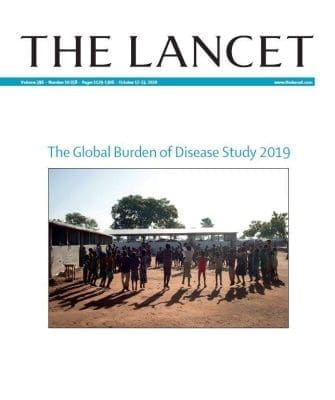FEW people in the Australian beef industry are likely to be familiar with the Global Burden of Disease study, but its influence over global food policies cannot be underestimated.
 The study has been published biannually in scientific journal The Lancet since 1990. Its data is used to support the development of major dietary policies, including those of the UN Food System Summit, the EU’s Farm To Fork Strategy and the UK’s National Food Strategy.
The study has been published biannually in scientific journal The Lancet since 1990. Its data is used to support the development of major dietary policies, including those of the UN Food System Summit, the EU’s Farm To Fork Strategy and the UK’s National Food Strategy.
The most recent edition of the Global Burden of Disease study published in 2019 contained the staggering claim that global human deaths from eating red meat had risen from just 25,000 in 2017 data to 896,000 in 2019 data – a 36-fold increase in the threat to human health from eating meat in two years.
That has been widely seized upon to justify global food policies encouraging lower red meat consumption, but has also been challenged by a team of independent international scientists who have questioned the veracity of the data underpinning the claim.
Now it has emerged that the authors of the report have missed a deadline to produce the evidence required to defend their data.
An article in UK food industry publication The Grocer drew attention to the issue late last year.
It reported how the dramatic increase in claimed red meat related death rates included in the 2019 Global Burden of Disease report prompted a team of international scientists, including Professor Alice Stanton from the Royal College of Surgeons in Ireland and globally-recognised meat expert, Professor Frederic Leroy from Vrije Universiteit in Brussels, to conduct a “forensic examination” of the data in the GBD study and its assumptions.
The scientists also compared the data to a collection of existing global meta-analyses which had studied the relationship between eating red meat and human ill-health and deaths.
The conclusion from their research was clear: There was “no relationship” to be found between the meta-analyses and the GBD data.
The scientists contacted The Lancet, stating that it would be “highly inappropriate and imprudent” for such estimates to be used in any national or international policy documents, “nor in any regulatory or legislative decisions”.
The scientists requested the authors of the GBD analysis to cite the reasoning behind the 36-fold increase in global deaths linked to red meat.
Professor Stanton explained her concerns that the GBD was using figures to suggest eating meat had become significantly more dangerous to human health, without publishing any supporting evidence.
“What would happen to child and maternal nutrition, iron deficiency and anaemia rates worldwide, if [the data] was obeyed? There are huge dangers to human health if we don’t objectively look at the available evidence,” she said.
Despite repeated requests for The Lancet to peer review the data and to publish the evidence behind it, the scientists’ requests were either declined or ignored.
Further requests to the GBD team at the University of Washington to publish its evidence were also refused, according to The Grocer.
In an update to the issue on Monday, Diana Rodgers, a registered dietitian and the author and filmmaker behind the Sacred Cow book and movie, noted in her regular Sustainable Dish email newsletter that the Lancet has since changed its position, apparently in response to the pressure applied by the article in The Grocer.
Ms Rodgers said it seemed The Lancet has since agreed to ask the authors of the GBD for the evidence.
However, so far, the researchers have missed their two-week deadline to defend their data.
Last weekend Ms Rodgers spoke on a panel discussion at the Food Fluence conference in Washington DC, where she said Dr Alice Stanton gave a strong presentation about why the large jump in mortality numbers from red meat between 2017 and 2019 contained in the GBD was not supported with any evidence.
Ms Rodgers noted that the GBD is often used as evidence for dietary policies and the dramatic increase in disease risk it attributed to beef “could spark recommendations around the world for drastic reductions in red meat consumption”.
In her own address to the FoodFluence conference, Ms Rodgers made the case that anti-meat messages in the media and from programs like Meatless Mondays are “unethical” because they are overly simplistic and misrepresent the science.
“In low-and middle-income countries, owning livestock is not only a good source of critical nutrients but also an important income stream, especially for women.
“And in high-income countries, the majority of our diet is in the form of ultra-processed foods which are nutrient-poor and stimulate us to overeat.
“A reduction in junk food is what’s needed, not a reduction in meat, especially in our schools, where lunch may be the only or most important meal kids get all day.”
‘A reduction in junk food is what’s needed, not a reduction in meat’
Globally, 1 billion people worldwide do not consume enough protein, and 1.6 billion pre-school aged children and women of reproductive age were deficient in one or more minerals, she said, including iron, zinc, Vitamin D and folate.
“Some of the critical benefits of animal-sourced foods include the only source of retinol, heme iron, vitamin B12 and vitamin D. ASF also contain highly bioavailable zinc and protein. They’re the only source of DHA and EPA (with the exception of algae), and they contain uniquely potentially beneficial compounds including creatine, anserine, taurine, cysteamine, and CLA.”





HAVE YOUR SAY